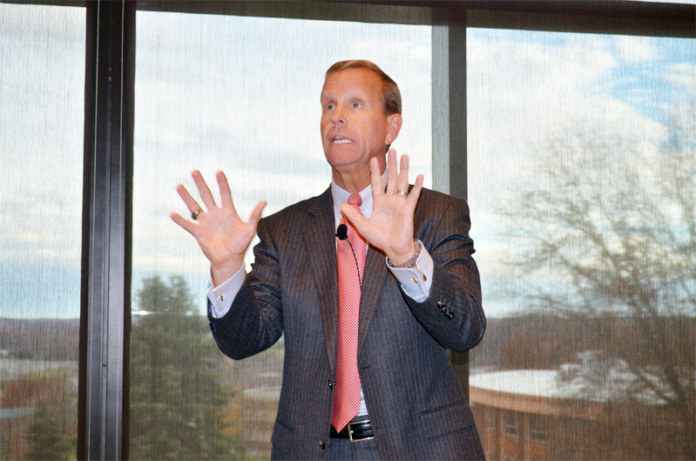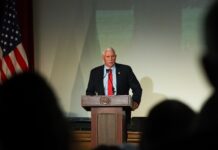Frank T. Brogan, Chancellor of the Pennsylvania State System of Higher Education (PASSHE), is traveling all over Pennsylvania with each of the 14 PASSHE universities as stops so he can introduce himself to the universities’ communities. Slippery Rock University was number 10 on Brogan’s cross-state tour after visiting California University of Pa. Tuesday and before visiting Edinboro on Thursday. Slippery Rock held a public forum for the chancellor Wednesday at 3:30 p.m. in the theater of the Robert M. Smith Student Center.
“Getting out to all the Universities is not the gracious thing to do, it’s the right thing to do,” Brogan said. “It is important, I think, to at least talk to and listen to some of the representation of the University community.”
Brogan commented on the positive things Slippery Rock’s admissions program is doing, especially with regards to social media and recruiting international students.
“The more students can rub elbows with students from other parts of the state, other parts of the country, and other parts of the world, it gives them a more eclectic experience without even leaving the campus,” Brogan said. He felt that this was an important part of a good education.
Some of the other state universities are not so fortunate.
“Here’s the rub, some of our universities are dealing with some rather significant declining enrollment, in large measure because the areas in which they reside are dealing with declining population generally and therefore declining high school populations generally,” Brogan said.
“We’re going through some tough times as a system right now, but guess what, who isn’t?”
For Brogan, addressing these tough times means looking to the future and where the state system is going.
“Here’s the rub, as old as the commonwealth is, even the commonwealth is trying to figure out what it wants to be for the next 50 years,” Brogan said. “The question is where do we [as a system] go next.”
Mostly focused on PASSHE as a whole, Brogan said, his address to the University was centralized around one word: system.
“It is important that we as a system look at what we’ve done, what we do, and what we’re going to need to do in the future in order to make sure that we are competitive,” Brogan said.
“You do not have to surrender what makes you unique and different to be a part of a system,” Brogan said, emphasizing the idea that the PASSHE schools, while functioning as different individual universities must also be able to come together as a single entity in the state system. “We’ve got to organize ourselves as a system,” he added. He stated that there was an unmistakable derived benefit in coming together as a system.
While Brogan wants to maintain the differences and uniqueness present in each school, he also does not want that to transform into any of the universities serving as giant vocational schools.
“We are not nor should we ever become giant vocation schools,” Brogan said.
However, Brogan stated that the general education was something to examine more closely.
“It is something I think we need to look at is our [general education] program and look at it deeply, just to make sure it is a world class experience for any student in any PASSHE school.”
This examination will include determining what works and what needs changed or eliminated.
“Here’s the rub, you close down some of our programs they are typically programs that are undersubscribed with students, they are typically, and please allow me the generalization, they are typically programs without a sufficient enough demand at the other end of the pipe to assure students that there’s a great chance they’re going to be hired in the Commonwealth when they get out of it, and they are often programs that have been kept on life support for years.” Brogan explained. He said that the life support is being gained by taking money from other programs.
“The final cut is to say we can no longer have that program for a variety of reasons. That’s where the rubber meets the humanity road,” Brogan said.
“We would be naïve if we didn’t know that programs cost money and we’ve got to keep them buoyant and involving,” he said.
Still, Brogan wanted to make clear that this was not an effort to destroy the humanities adding, “It doesn’t mean to kick the humanities and fine arts and the arts to the curb. Those programs provide us with something that make us different from any other education delivery system that’s out there – the well rounded educational experience.”
“At the end of the day, we’ve got to organize ourselves in a way that will also assure that that well rounded education is meeting the needs of the commonwealth and country and the world.” Brogan concluded.







